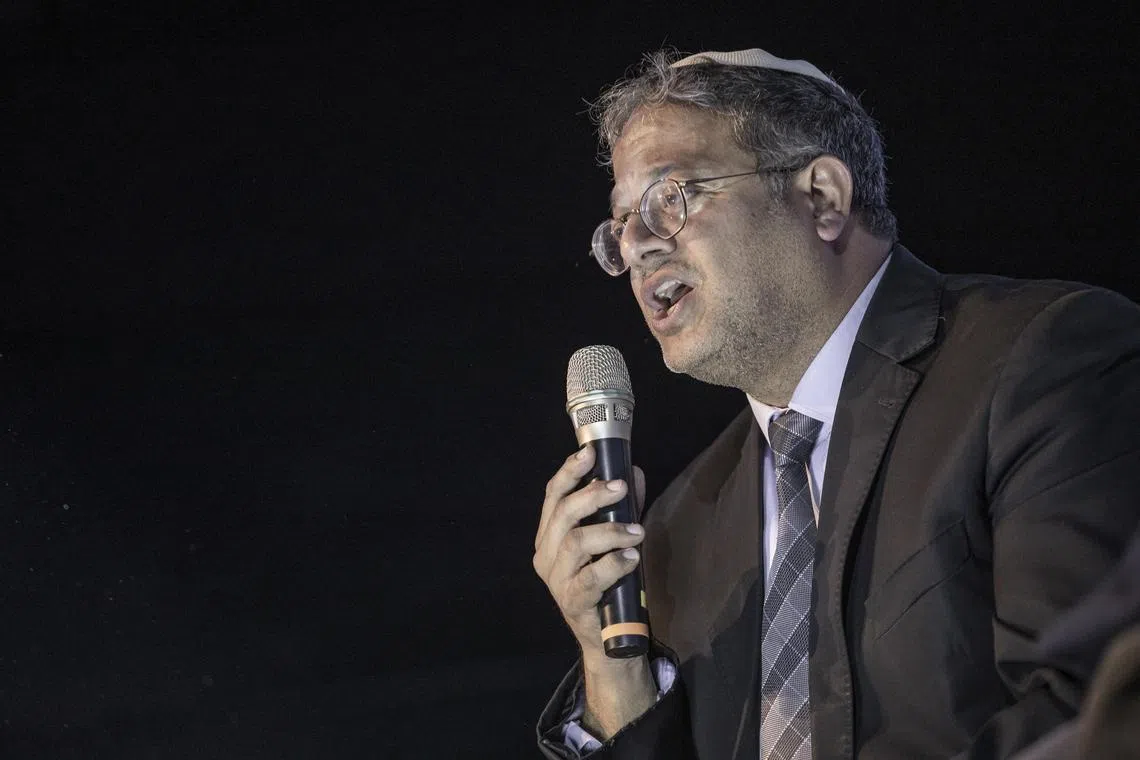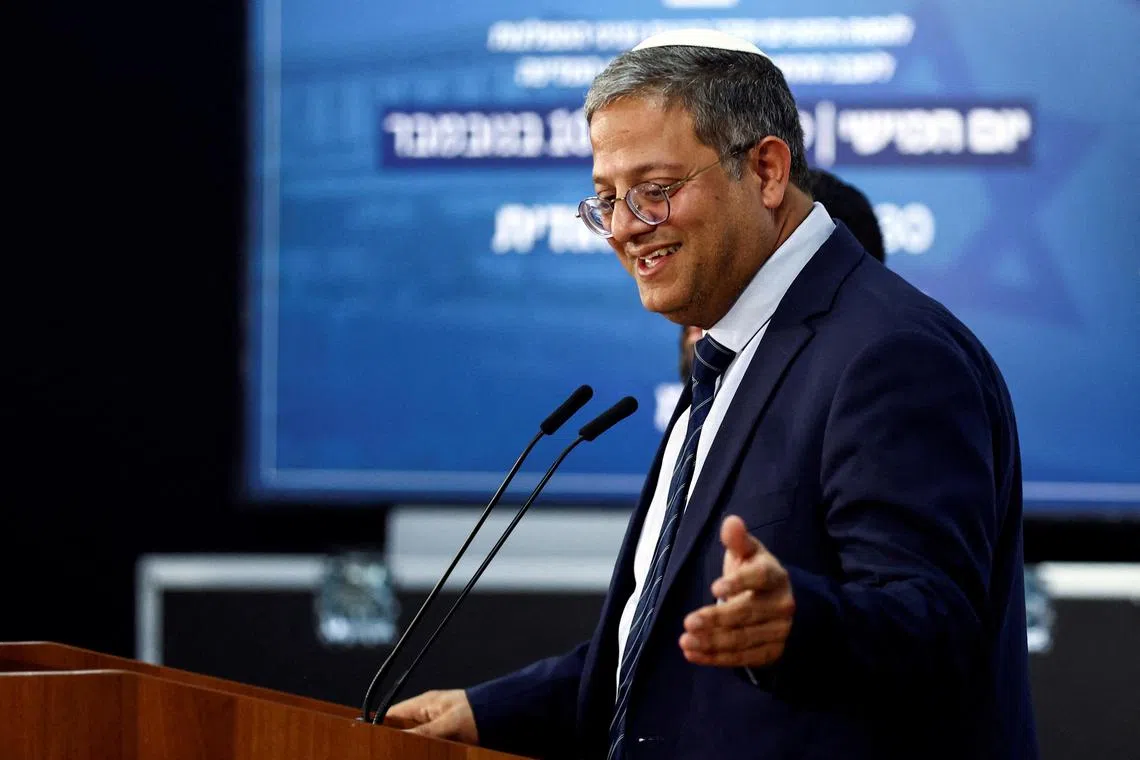Israeli youth lead turn to the far-right as violence increases
Sign up now: Get ST's newsletters delivered to your inbox

Mr Itamar Ben-Gvir is a far-right leader with a history of extreme views.
PHOTO: NYTIMES
TEL AVIV – Yehuda Bar used to vote for Benjamin Netanyahu’s Likud party, but after serving in the military in the occupied West Bank, he switched this election to Itamar Ben Gvir, a far-right politician.
“I voted for him because of security,” said Bar, 23. “Maybe he’s extreme, maybe he’s a racist, but from what I’ve seen, he stands by what he believes in.”
For Bar, and other voters – many of them young men – Mr Ben Gvir’s appeal comes from his promise to give Israeli soldiers and policemen a much freer hand in dealing with violence from Palestinians, both political and criminal.
“Anyone who throws stones, anyone who breaks into a military base to steal weapons gets a bullet to the head,” Bar said when asked what changes he would like to see.
While much of the world sees Israel’s long-running occupation as that of a well-equipped military imposing its will on a largely helpless civilian population, a growing number of Israelis see the situation very differently.
“Millions of Israelis feel bullied and unprotected,” said Yishai Fleisher, a spokesperson for Mr Ben Gvir’s party Otzma Yehudit (Jewish Power). “They feel that their government and their police have been disempowered. That’s why Ben Gvir did so well.”
As Mr Netanyahu assembles a government with ultra-Orthodox and ultra-nationalist parties, placing himself in the unusual role of moderate, Israel’s shift to the right has been widely noted. Less understood is a key source of the shift: fear that armed conflict is rapidly arriving.
“The inner security situation in the last decade has deteriorated to a level that might be even existential in the long-term,” said Amir Avivi, a retired brigadier-general who founded the non-profit Israel Defense And Security Forum of former officers, referring both to Israel and the West Bank. “People are not feeling safe.”
The Israeli military says 2022 saw a doubling of arms smuggled into the West Bank by Palestinians over the year before.
That, combined with a deterioration of the Palestinian Authority’s control over West Bank cities and a sharp rise in the number of Israeli settlers, forms the backdrop to the attacks that have killed 31 Israelis, the most since 2008. The security services have killed more than 140 Palestinians in the West Bank and Jerusalem, the highest number since 2004.
Twice before, in 1987 and 2000, Palestinians fought against Israeli rule in the occupied territories in popular uprisings that came to be known by their Arabic name: intifada. Israel is now bracing for a third.
“Israeli security officials I met with recently all said the next intifada is on its way,” said Martin Indyk, a former US ambassador to Israel now at the Council on Foreign Relations in New York.
Sabri Saidam, a senior member of Fatah, the party which controls the Palestinian Authority, agrees. “There will indeed be a Palestinian intifada if the international community does not decide to put pressure on Israel and the Israeli politicians do not wake up to the reality,” he said.

Former Prime Minister Benjamin Netanyahu arrives for a campaign event in Ofakim, Israel, on Oct 19, 2022.
PHOTO: NYTIMES
Mr Ben Gvir, 46, is a West Bank settler. Once the government is sworn in, he is expected to control the national security ministry. His supporters hope he will translate his hardline rhetoric on crime, security and restoring “Jewish pride” into tangible policies.
His support comes both from West Bank settlements and working-class neighbourhoods inside Israel. And while security fears are a prime driver, so is a religious nationalism aimed at ensuring Jews a favoured place in Israel.
“He’s talking about an uncompromising version of what it means to be a Jewish state that is unapologetic about developing policies to privilege Jews and diminish the status of everybody else,” said Dahlia Scheindlin, a left-leaning political scientist.
A growing number of Israelis, especially the young, now consider themselves right-wing.
The Israel Democracy Institute found that more than three quarters of those aged 18-34 voted for right-wing or moderate right-wing parties last year. The figure was 67 per cent for those aged 35-54, and just over 56 per cent for those over 55.
Mr Ben Gvir’s supporters say soldiers are turned into sitting ducks when they are sent to maintain order over an increasingly restless Palestinian population. Many security professionals, however, say there are no problems regarding rules of engagement, and Mr Ben Gvir’s solutions are unrealistic.
“We have a young generation that looks for quick solutions, combined with one person who promised them a quick solution,” said Nitzan Nuriel, a former army brigadier general, and a former director of the Counter-Terrorism Bureau at the Prime Minister’s Office.

Israeli ultranationalist lawmaker Itamar Ben-Gvir speaks during consultations on Israel’s next government in Jerusalem, on Nov 10.
PHOTO: REUTERS
Despite the occupation, Israel’s international status and economy have grown due to its technological and defence prowess.
It’s unclear whether the new government could see those processes slow or reverse, especially the expansion of regional relationships. Even the US, Israel’s closest ally, has expressed concern about the policies advocated by Mr Ben Gvir and others expected to join the government.
Agreements between Israel and the Palestinians gave responsibility for public order in most West Bank cities to the Palestinian Authority, with Israel controlling the rest of the territory until a two-state solution could be agreed upon.
But with negotiations stalled for years, the Authority’s security services have been losing their grip. And many in the incoming government reject a Palestinian state.
“Year after year, the Palestinian Authority has been weakened,” said Khalil Shikaki, director of the Palestinian Center for Policy and Survey Research in Ramallah. “No winner comes out of this unless the Israelis address the root problem, which is a weak Palestinian Authority they have created.” BLOOMBERG


